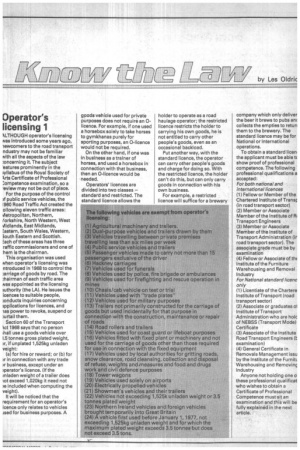Operator's licensing 1
Page 51

If you've noticed an error in this article please click here to report it so we can fix it.
NLTHOUGH operator's licensing was introduced some years ago, iewcomers to the road transport ndustry may not be familiar with all the aspects of the law :oncerning it. The subject 'eatures prominently in the lyllabus of the Royal Society of kris Certificate of Professional ompetence examination, so a • eview may not be out of place. For the purpose of the control )f public service vehicles, the i960 Road Traffic Act created the ollowing eleven traffic areas: wletropolitan, Northern, (orkshi re, North Western, West i/lidlands, East Midlands, Eastern, South Wales, Western, 3outh Eastern and Scottish. Each of these areas has three raffic commissioners arid one of hem is the chairman.
This organisation was used when operator's licensing was ntroduced in 1968 to control the :arriage of goods by road. The :hairman of each traffic area was appointed as the licensing luthority (the LA). He issues the icences to suitable people, :onducts inquiries concerning ipplications for licences, and las power to revoke, suspend or :urtail them.
Section 60 of the Transport kct 1968 says that no person ihall use a goods vehicle over 1.5 tonnes gross plated weight, ar, if unplated 1,525kg unladen veight: (a) for hire or reward; or (b) for gin connection with any trade ar business, except under an )perator's licence. (if the inladen weight of a trailer does lot exceed 1,020kg it need not )e included when computing the veight).
It will be noticed that the requirement for an operator's icence only relates to vehicles Jsed for business purposes. A goods vehicle used for private purposes does not require an 0licence. For example, if one used a horsebox solely to take horses to gymkhanas purely for sporting purposes, an 0-licence would not be required.
On the other hand, if one was in business as a trainer of horses, and used a horsebox in connection with that business, then an 0-licence would be needed.
Operators' licences are divided into two classes — standard and restricted. The standard licence allows the
holder to operate as a road haulage operator; the restricted licence restricts the holder to carrying his own goods, he is not entitled to carry other people's goods, even as an occasional backload.
Put another way, with the standard licence, the operator can carry other people's goods and charge for doing so. With the restricted licence, the holder can't do this, but can only carry goods in connection with his own business.
For example, a restricted licence will suffice for a brewery company which only deliver the beer it brews to pubs anc collects the empties to returi them to the brewery. The standard licence may be for National or International operations, To obtain a standard Hoeft the applicant must be able tc show proof of professional competence. The following professional qualifications a accepted: For both national and international licences (1) Fellow or Member of the Chartered Institute of Transf (in road transport sector) (2) Member or Associate Member of the Institute of RI Transport Engineers (3) Member or Associate Member of the Institute of Transport Administration (ir road transport sector). The associate grade must be by examination (4) Fellow or Associate of thi Institute of the Furniture Warehousing and Removal Industry Far National standard licenc only
(1) Licentiate of the Chartere Institute of Transport (road transport sector)
(2) Associate or graduates oi Institute of Transport Administration who are holc of NEBSS (Transport Mode) Certificate (3) Associate of the Institute Road Transport Engineers (k examination) (4) General Certificate in Removals Management issu by the Institute of the Fumitt Warehousing and Removinc Industry Anyone not holding one cc these professional qualificat who wishes to obtain a Certificate of Professional Competence must sit an examination and this will be fully explained in the next article.
























































